How to control my (your) anger (better) (issues, anxiety, sadness, outbursts, frustration) | How to control anger (issues) in a relationship (at home, work, school) | I don’t know how to control my anger
Hello friends, how are you doing today? Welcome to #Relationships-Parenting website / blog.
Let you and your well-wishers live a happy and prosperous life through out your life term.
In this website / blog, you will always learn about #Relationships #Parenting.
Also subscribe / follow to our various social media networks from here to learn more about #Relationships #Parenting:
Just before going to “How to control my (your) anger (better) (issues, anxiety, sadness, outbursts, frustration) | How to control anger (issues) in a relationship (at home, work, school) | I don’t know how to control my anger“, let us know a brief, basic and very important information.
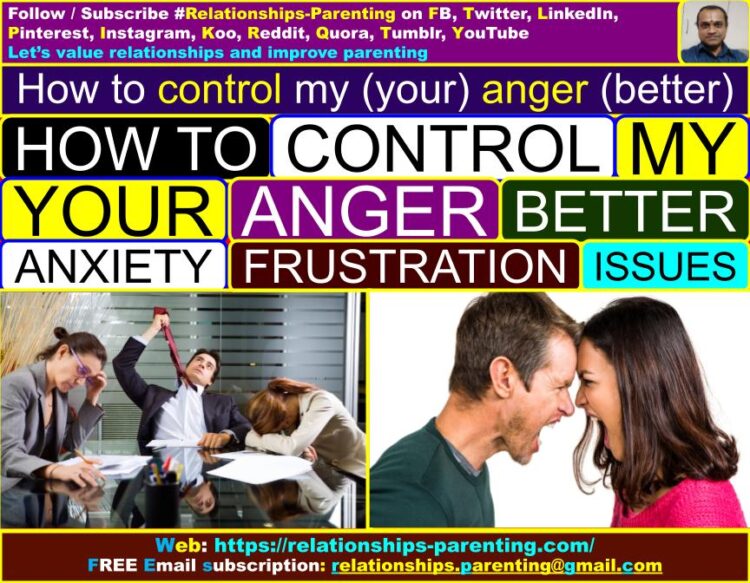
Anger meaning : To be angry is to become furious and enraged. People who get angry frequently are called short tempered people.
Some examples of people getting angry are traffic, homework, parents, children and the weather all the time. If you get angry, you lose your mental balance and you may speak furiously and act like a madman.
Anger control meaning : Anger control is not only about controlling your external physical behavior, but also about controlling your internal mental reactions.
If you control your anger, you will automatically lower your heart rate, calm yourself down, will be able to think more positively, have feel less anger etc.
Some of the commonly asked questions or frequently asked questions (FAQs) about this subject is as given below:
How can I reduce my anger? | Why do I get angry so easily? | What are the keys to controlling anger? | What to do when angry? | Ways to overcome anger | I can’t control my anger |
How to control my anger towards my girlfriend | What are the types of anger | Anger management exercises | Anger issues test | Productive ways to deal with anger | How to stop being angry at someone

Every human being on this earth has witnessed anger in one form or another. Anger can vary widely from mild irritation to extreme furiousness and can be triggered by many different things, such as specific people, events, memories, personal problems etc.
Anger is a natural and potentially harmful human response. Sometimes, anger can get out of control and become destructive and problematic.
So why do so many people get angry? People get angry when their expectations are not met – whether those expectations are about their own future or that of others, such as family members, and sometimes even others.
So, how can we control our anger? – This post (article) provides various techniques, skills and ideas to control your anger. If you read and follow all these points, you will surely become a better person than you are now day by day. So, let’s begin…

List of about “How to control my (your) anger (better) (issues, anxiety, sadness, outbursts, frustration) | How to control anger (issues) in a relationship (at home, work, school) | I don’t know how to control my anger” is as given below:
Give-up your ego (pride) : Many of us get angry very easily if our ego or pride is not satisfied, when it is satisfied we feel joy and happiness. Behind anger is always fear of powerlessness or fear of losing a person or belonging/object.
Angry people think that being aggressive and overreacting is the best way to show that they are physically and mentally strong, which is a fool’s errand.
When we are better than someone or an opponent, we feel superior, but when we are inferior to someone, we feel sad.
This constant toggle of our mindset and our desire to seek fulfillment through comparison is the root cause of what we know as ego or pride. Low self-esteem is often the main catalyst that triggers an inflated ego or pride.
Low self-esteem can be caused by a number of factors, including: A history of rejection | A series of perceived or real failures | A history of trauma – being humiliated, bullied or put down by others |
A mental health problem such as depression or anxiety. | Having strong feelings of guilt, shame or worthlessness etc.
How to give up our ego (pride)? – Learning to be positive allows you to take an active hand in the changes life throws at you.
By positive your brain begins to function in a more free-flowing state, and you’ll also notice a boost in feel-good hormones called endorphins, which keep you physically light and happy, decreasing your ego (pride) slowly but consistently.

Communicate properly : The way we communicate or the style we use to communicate is learned from our earlier experiences in life when our language skills are newly formed. Most of us tend to communicate in ways that fit the environment we grew up in, but that is problematic in our lives today.
Proper communication skills are an essential component of anger management because poor communication can cause untold emotional pain, misunderstandings and conflict.
Words are powerful, but the message we convey to others is even more powerful and determines how people respond to us and how we feel towards them.
Proper communication at work or home or school is extremely important because it allows members to express their wants, needs and concerns to each other.
Open and honest communication creates an environment that allows people to express their differences and express love and appreciation for each other.
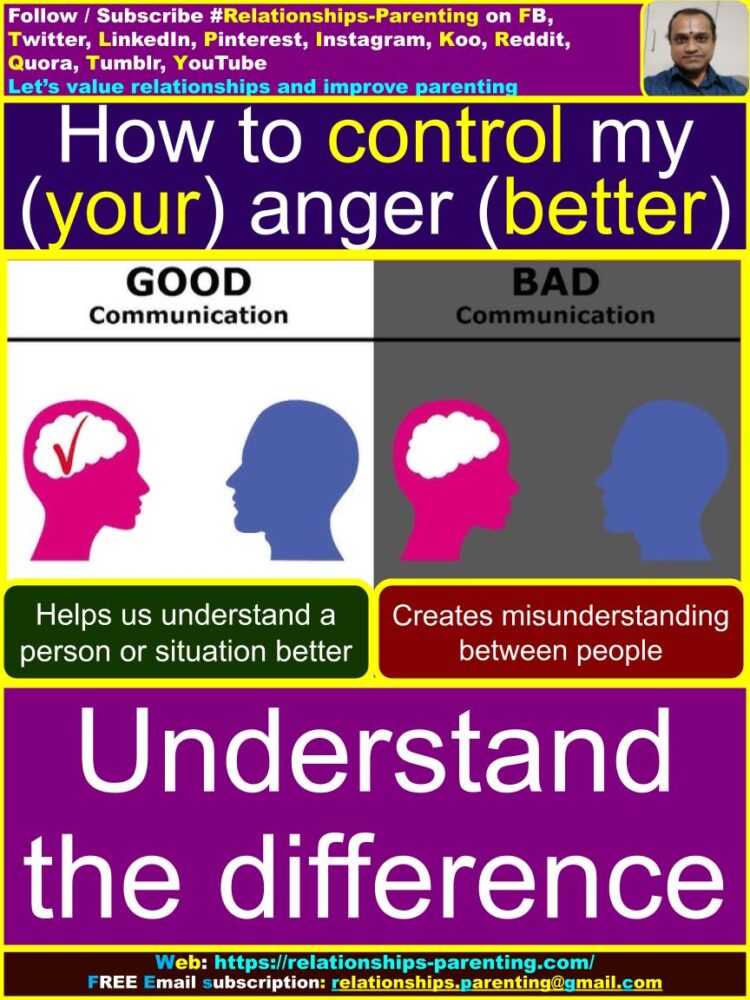
Adapt for the new changes : ‘Change is the only constant’ is a statement that depicts how life and everything in it is subject to amendment. Learning how to adapt is key to your overall well-being, may be at home or work or school or anywhere.
Change is all around us, you have to have special eyes to see it. Some changes are constant, just like one season changes to another, while others are evolutionary and progressive, throwing new situations our way as time passes.
People who are not adaptable to changes are not able to taste real success in life. For some people, it’s natural to dislike change – it often requires stepping out of your comfort and security zone.
But adapting to change, the process of reinventing your behaviors, thoughts, and feelings becomes an important protective feature in your psychological development. Change now or you will get rusted.
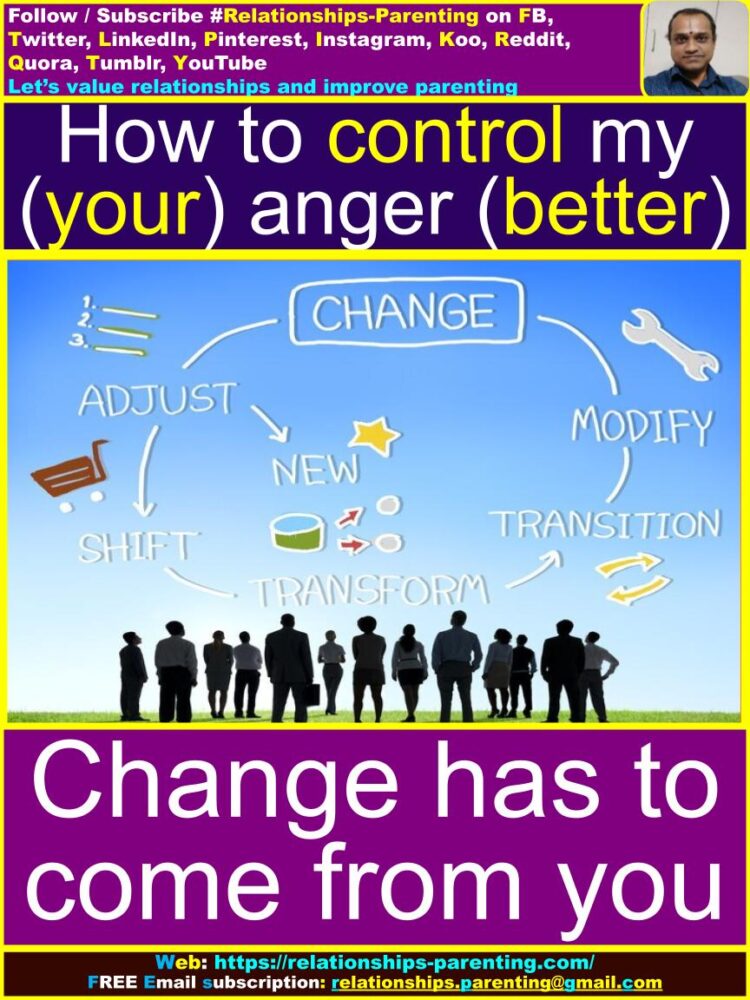
Add humor to your life : The main benefits of laughter include stress reduction, strengthening social connections and the release of your body’s “feel good” chemical, endorphins.
Consequently, according to researchers, one of the many benefits of laughter and humor is its ability to combat anger, anxiety and depression.
Laughter increases your intake of oxygen-rich air, stimulates your whole body including heart, lungs and muscles, and increases the endorphins released by your brain. Laughter activate and relieve your stress response.
Therefore, laughter is one of the best medicine for all age groups’ mental health. More than humor, being with others makes us more happier. Laughter benefits our connection with others.
In turn, strong connections benefit our mental and emotional health. When we laugh with our family or group of friends, the bonds between us become stronger. Laughter brings us together. Overall, humor and playfulness strengthen our relationships at home or work or school or anywhere.

Do some household chores : Whether you are the president of your country or a security guard in a company, if you help your spouse with household chores, it will automatically help you in anger management, not just in the short term, but really in the long run.
If your mind is out of order and stressed, helping in some household chores like organizing drawers, washing dishes, or mopping floors can boost your mood and reduce your anxiety.
See getting rid of all the dirt as a way to throw away your anger to make room for fresh ideas. Top it off with a couple of swipes with a damp mop and your sparkling, disinfected floors will be a definite mood booster.
Angry cleaning (or rage cleaning) is the act of tackling a cleaning project with the intention of releasing pent-up emotions.
Pushing yourself physically forces you to release that energy while focusing on the task rather than dwelling on negative thoughts. It also puts you in a position of self-control.

Take breaks regularly : Giving importance to your business or studies or making millions or billions of dollars is not a positive sign for your overall physical and mental health. You should take breaks regularly to maintain balance in your life.
Additionally, a relaxing break can help reset your mood, thereby promoting positive well-being and reducing stress. Try to make some time for your family and friends at least one or two days a week.
It automatically relaxes your mind and makes you go back to your work with a fresh mind. It impulsively reduces your anger at work or other places. The more your mind is relaxed, the better you can work or study and control your over anger.
Taking a break from work increases your focus when you return to work, thus improving your overall productivity.
Additionally, taking breaks relieves lot of stress, which can help your mental health and well-being. These factors contribute to increasing not just job satisfaction, but your complete life satisfaction too.

Think twice before speaking rudely : Speaking rudely often has a detrimental effect on relationships at home or at school or at work, so it’s important to learn and recognize its signs.
These can include someone who doesn’t listen or pay attention, or someone who focuses only on themselves, or someone who gets defensive during a conversation.
Words that seem neutral can be provocative if spoken with a sarcastic, condescending, or dismissive tone, causing hurt and disrespect to the listener.
A soft voice is often interpreted as a lack of confidence – but too loud voice, and you come across as aggressive. The tone of voice we use can positively or negatively affect our interactions with others, especially those closest to us.
How you talk and what you and your partner say to each other greatly affects your feelings and the quality of the relationship at home or work or school.

Identify your anger issues : Additionally, there are many other emotional aspects that you may experience when dealing with anger issues, including: constant irritation, rage, frustration, anxiety, stress, guilt, feeling overwhelmed with a particular person or thing, etc.
Anger becomes an uncontrollable issue when you have trouble controlling it, causing you to say or act physically and regret it later. According to a study, uncontrolled anger is bad for your physical and mental health.
This can quickly escalate into verbal and / or physical violence, harming you and those around you. Rage, stressors, relationship problems, work tension, financial pressures etc. can trigger anger within you.
Individuals with underlying problems such as alcohol abuse or mental health problems are more prone to anger. You need to identify exactly what your problem is and manage it better than before to keep-out your anger issues.
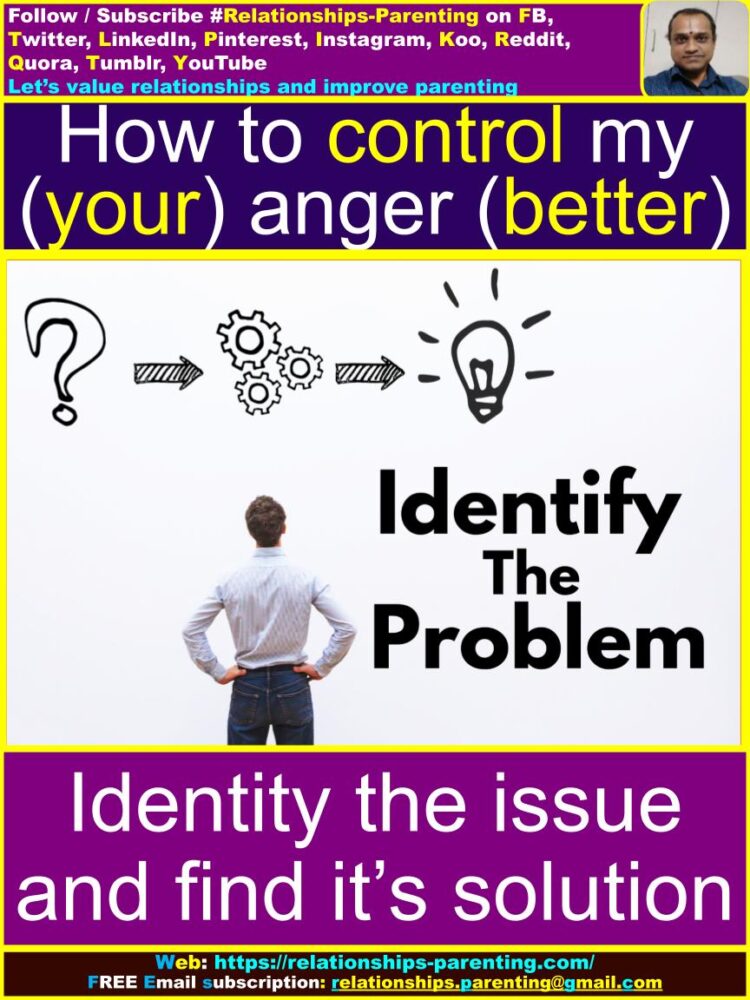
Do Meditation and Yoga : Meditation and Yoga is beneficial for people who struggle with anger. These skills allows the person to be present, more aware of their feelings, and respond positively to people and events.
The practice of mindfulness Meditation and Yoga can reduce the cognitive, emotional and physical responses we have to anger triggers. Practicing Meditation and Yoga can help reduce stress and promote relaxation.
That is why breathing exercises like Pranayama is a good choice for moments of anxiety, stress or tension. Like breathing exercises, meditation calms your nervous system.
It helps you engage with and process difficult emotions like anger. Meditation and yoga can bring you calm, peace and balance that will benefit both your emotional well-being and your overall health.
You can use it to relax and deal with stress by focusing your attention on something calming. Meditation and Yoga teaches us how to be more present in the moment, which is extremely helpful for relationships at home or work or school.
One study found that regular Meditation and Yoga was linked to more laughter, empathy and sociability. Increases emotional intelligence.

Give-up bitterness and grudge : A study found that holding bitterness and grudges was associated directly with poorer physical health. People who reported “having bitterness and grudge for years” were more likely to have medical problems such as heart disease, stomach ulcers, and chronic pain.
Holding bitterness and grudge often means holding onto anger and stress. When we hold on to hatred and resentment, it’s like drinking poison and expecting the other person to get sick.
People who hold grudges and bitterness often have a negative approach to life and harbor emotions like: jealousy, envy, toxic anger, etc. To release grudges and bitterness, better understand other people’s point of view, try to put yourself in their shoes.
The more you understand who you hold grudges and bitterness against, the easier it will be to let go of that grudges and bitterness. The faster you do this, the better you will be before the danger red light flashes for you.

Ignore fake news on social media : Algorithms in social media select content that elicits anger and outrage from its users to increase engagement. And sometimes, those extreme emotions turn into extreme actions like mental and physical behaviors like anger, rage etc.
These observations suggest that fake news consistently elicits more anger and less happiness than real news, and that anger may fuel the rapid spread of fake news online.
Many studies have shown that social media causes stress and anxiety in users, which in turn causes anger and rage in users.
A series of recent studies have shown that social media is linked to depression and anxiety, especially among young people. Social media platforms drive dopamine surges into the brain to keep users coming back again and again.
Shares, likes and comments on these platforms trigger the brain’s reward center, resulting in a feeling similar to what people experience when gambling or using drugs.

Walk a lot : Physical activity can help reduce stress that can cause you to feel angry. If you feel your anger rising, go for a brisk walk or run. Or spend some time doing other enjoyable physical activities.
In addition to being healthy for your physical functions, regular walking is very effective in reducing stress on the body and mind. Try to do some exercise every day to keep stress and anger at bay.
For a quick way to deal with anger, go for a brisk walk or run. Long distance running, biking, skiing and other outdoor activities not only give you more energy to finish it but also give you time to cool your angry thoughts.
Long distance travel allows you to experience many emotions and in the end, you will be more resolved. Walking can help boost your mood because it increases blood flow and circulation to the brain and body.
The more your daily walks, the more active you will be physically and mentally and in turn the less aggressive and angry you will be.
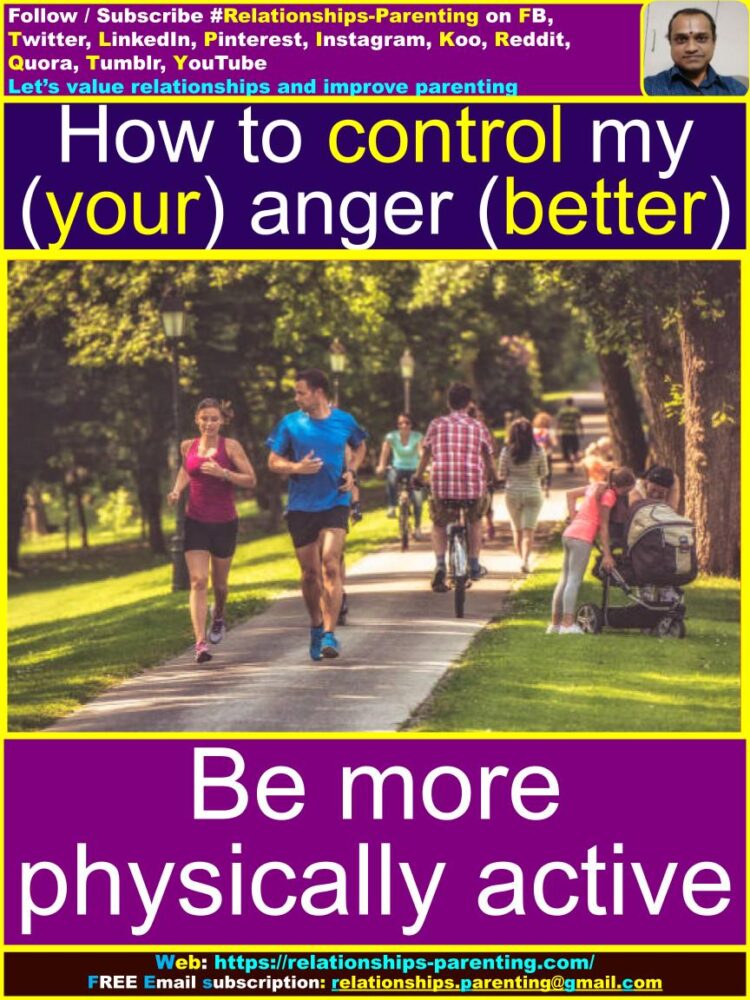
Play with your family and friends : Any kind of game with your family and friends will occupy your mind and make you worry-free.
Playing with family and friends is especially helpful for you during stressful times because it brings a sense of happy togetherness, which is exactly what you need to feel safe and secure.
Video games will free your from physical and mental pain and psychological trauma. Video games can also help people dealing with mental disorders such as anger, anxiety, depression, attention deficit hyperactivity disorder (ADHD), and post-traumatic stress disorder (PTSD).
Research suggests that stress reduction can be achieved through playing games indoor and outdoor. Play helps to process difficult emotions and relax, which helps reduce stress levels.
Prioritizing a healthy balance of playtime for yourself is important, as it provides you with purpose, control, and free expression.

Eat controlled diet : A growing body of research reveals that what we eat is a significant factor in how angry we feel. In fact, a popular university study showed that a diet high in trans fatty acids was directly linked to increased aggression and anger in human behavior.
Foods high in refined carbohydrates, such as white bread, pasta and pastries, can cause rapid spikes and crashes in blood sugar levels.
It can cause heavy mood swings, irritability and decreased emotional stability, exacerbating anger. Refined sugar, including white flour, causes the release of inflammatory messengers called cytokines.
Studies suggest that a strong link between high levels of cytokines and depression. Over intake of sugar causes anxiety and irritability. Reactive hypoglycemia is especially problematic for people with bipolar disorder.

Talk to an Expert : Anger is a common, generally a healthy human emotion. But ,when anger gets out of control and turns destructive either to self or to others, it can lead to problems.
Experts like psychologists can help people identify and avoid triggers that make people angry. Much of the research on anger treatment has focused on Cognitive Behavioral Therapy (CBT).
In CBT, patients learn to identify unhelpful or negative thought patterns and change erroneous beliefs. One CBT-based anger treatment is called Stress Inoculation.
Talking therapies and counseling involving talking about your problems with a trained professional such as a counselor or psychotherapist is helpful in dealing with anger.
They can help you explore the causes of your anger and ways to manage it. It helps you understand your emotions and improve your responses to situations that make you angry.

More information will be added to this on regular basis. Please visit this post and blog / website to know more about relationship and parenting.
Continue reading about:
To know more about “Husband and wife information, facts“, please click the below link:
Husband and wife information, facts
Dear friends, if you need any clarifications about this post, kindly let me know, I will definitely try to answer all of them.
Also add your COMMENT below, SHARE on different SOCIAL MEDIA networks.
This will help to know the quality of this content and also it will be helpful to know if any improvements is required for the content.
If you feel this content is useful to you and has helped you to improve your knowledge, kindly share this with your well-wishers.
Because “SHARING MEANS CARING”.
To receive FREE EMAIL SUBSCRIPTION about #Relationship #Parenting, you can send an email to [email protected] from your email ID.
Let you and your well-wishers live a prosperous, healthy and fearless life through out your life term.